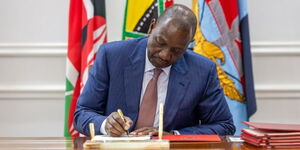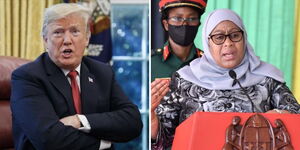Kenya's cancel culture has claimed another high-profile figure. This time, the First Lady, Rachel Ruto, has found herself in the crosshairs of public ire, resulting in the abrupt cancellation of a planned fundraiser at Lavington United Church.
The event, originally scheduled for Sunday, June 30, was intended to raise funds for the completion of the church’s sanctuary.
A staunch Christian, Rachel Ruto, was set to be the chief guest at the fundraiser. However, the invitation card, which was signed by Reverend Simon Mutahi, sparked widespread outrage online.
The card read, "The pastoral team and church leadership cordially invite you to a fundraising event to complete our sanctuary on June 30, 2024, from 10 a.m. at Lavington United Church. The Chief Guest will be Her Excellency Mrs Rachel Ruto, the First Lady of the Republic of Kenya. Your presence and generous contribution will be highly appreciated."
Kenyans, still reeling from the recent deaths of protesters shot by police during anti-Finance Bill demonstrations, directed their anger towards the church for involving a political figure perceived as unsympathetic to their plight.
The cancel culture that emerged ahead of the 2022 elections has now firmly taken root, with Kenyans unabashedly targeting politicians and other influential figures online.
As the country approaches the August 2022 elections, instances of online mob attacks become evident, with personalities being targeted for their stances on trending issues. These attacks often involve personal insults directed at degrading the individual’s character, family, and political associates, aiming to shame the target publicly.
Now, the campaign, driven by a younger, digitally-savvy generation, flooded social media with messages under the slogan "Salimieni huyo," which translates to "Greet them." This phrase has become synonymous with online campaigns targeting individuals seen as hurting the country or the anti-government movement, regardless of their actual involvement or stance.
Reverend Mutahi’s contact details were shared online, leading to a barrage of messages and calls. One particularly poignant message came from Mwabili Mwagodi, a prominent figure in the movement to keep politicians out of church affairs.
His message to Rev. Mutahi read, "Good evening Reverend Mutahi. My name is Mwabili Mwagodi. I am the person who started the campaign to get rid of politicians from the church pulpit in Kenya. I see here you have invited Mrs Rachel Ruto to your church for a fundraiser... This message is to notify you that we are coming for the fundraiser. God bless you."
The intense pressure from the public forced Rev. Mutahi to cancel the event. In a notice seen by local media, he announced, "The leadership and pastoral team of Lavington United Church wishes to inform members that the fundraiser event scheduled for June 30, 2024, has been cancelled."
This incident comes just days after anti-Finance Bill protesters stormed Parliament Buildings, resulting in several fatalities. In the wake of the violent protests, President William Ruto announced that he would not sign the controversial Bill.
Rachel Ruto's involvement in the fundraiser further inflamed the situation, as many Kenyans felt it was inappropriate for a political figure to participate in such an event amidst ongoing political tensions. The church, seen as a neutral sanctuary, became a battleground for the nation’s frustrations.
This is not the first time that Kenya's cancel culture has targeted public figures. Comedian Eddie Butita, actress Kate Actress, and musician KRG The Don have all faced similar online campaigns. The trend highlights a growing impatience among Kenyans with those perceived to be out of touch with the struggles of ordinary citizens.
The cancellation of the Lavington United Church fundraiser is also part of a broader pattern. Just recently, the Anglican Church of Kenya, Diocese of Eldoret, cancelled a similar fundraising event scheduled for the same day. The event, aimed at completing a perimeter wall and constructing a Sunday School church, was called off due to fears of backlash.
In another related development, President William Ruto pulled out of the Global Peace Leadership Conference, which was set to take place in Nairobi. The conference, scheduled from June 25 to June 27, was expected to address issues of peace and leadership. However, the growing unrest and the recent protests likely influenced the decision to withdraw.











